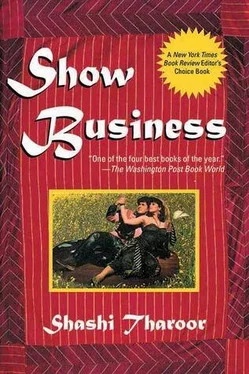“Sorry, Mohanlalji,” I sniff. “Couldn’t help it. Must be all this rain. I’m very wet. Achoo.” I dab at my offending proboscis, and my handkerchief turns an alarming color. It’s even more serious than I’d thought! No, I’ve just taken some makeup off.
Mohanlal looks decidedly unsympathetic. “Abhaji is being wet, too,” he says. “So also half the technicians, with perspiration if not with this water. How is it that you are only one who is catching cold?”
I am completely taken aback by this evidence of directorial heartlessness. “It’s hardly my fault, is it, if I — achoo!”
Mohanlal is spared the task of apportioning relative blame for the uncommon cold by the arrival of one of Abha’s chamchas. He is a lower grade of hanger-on in that he doesn’t travel with her, but shows up at the studio to run odd errands and generally gratify her sense of self-importance. Mohanlal turns to him, his anxiousness clearly heading from eight to nine. When Abha sends her sidekick to him, there are obvious grounds for fearing the worst.
“Memsahib not coming,” the chamcha announces importantly, confirming Mohanlal’s apprehensions. “Too tired.”
“Wh-a-at?” The director is up to nine now. “What do you mean?”
The sidekick switches to Hindi. “Abhaji says she is not coming back today for any more shooting. She is very tired after all those takes.” He looks meaningfully at me.
“But she can’t do this to me!” Mohanlal begins, quite literally, to tear out his hair, his long fingers running through the thinning strands like refugees fleeing in despair, taking with them what they can. “We’re behind schedule as it is.”
“That,” said the chamcha pointedly, “is not her fault.”
Mohanlal turns to me, murder in his ineffectual eyes. “This is your doing,” he breathes in a furious bleat, switching back to Hinglish for my benefit. “You are not being able to dance, you are not being able to move, you are not being able to do one song picturization right. No wonder Abhaji has had enough.” He reaches out for the chamcha, who is sidling away from this sordid domestic scene. “Where is she?” He returns to Hindi. “I’ll go and talk to her.”
“It won’t do any good,” the sidekick replies, with a knowing shake of the head. “And it might just have the opposite effect.” Mohanlal nods wearily. Abha’s rages are legendary: she is efficient and professional and even occasionally pleasant, but once her temper is aroused, flames leap from her tongue, singeing wigs at sixty paces.
“OK.” Mohanlal’s favorite two syllables emerge reluctantly, like air from a deflating radial. “We’ll take a break now,” he tells the technicians, who have begun to throng around us in the manner of the traditional Hindi movie crowd scene. He says this with a groan, a man at the end of his tether.
“Look,” I suggest helpfully in conciliatory Hindi, “while you all take a break, why don’t I try and have an extra rehearsal with Gopi Master?”
“Because he’d kill you, that’s all,” Mohanlal says with a sudden passion. “Which mightn’t be such a bad idea. Where is he?” He looks around, and spots the dance master in a corner, face buried in his hands in a mournful sulk of great intensity.
“Just trying to be helpful, that’s all,” I say, backing off. “You’re right, I don’t think we should disturb him. Maybe I could use a rest after all.”
“Rest?” Mohanlal is almost screaming. “If I were the producer, I’d give you permanent rest.” He must be upset; he has never spoken to me like this before. I will have to redraw the Scale. By the standards of everything that has gone before, this is practically an eleven.
But high anxiety has suddenly metamorphosed in my director into aggression. “You are not going to rest, Mr. Hero,” Mohanlal adds, jabbing his forefinger into my chest to punctuate his return to English. “I am telling you what you are going to do. You are going to get Abhaji back here. Is your fault she is not here, isn’t it, is your fault this picture is not having shooting now, is all your fault. So you get it going again. You were wanting to be filmi hero?” he demands rhetorically, taking me by the upper arm and propelling me toward Abha’s dressing room. “I am giving you your big chance. Enter the tigress’s den and bring her out. I am not caring if you are in her jaws and bleeding when she comes out, but you get her here.”
He might have put it a little less colorfully, I think, as I shuffle to the door. My diffident knock elicits no response. I try again.
“What is it?”
“Abhaji, it’s me. Ashok.”
“What do you want? I’m changing.”
“Just to talk, Abhaji. When you’ve changed.”
“There’s nothing to talk about. I’m going home.”
“I know, Abhaji. But I must talk to you. I need your advice.”
“Advice?” She laughs, but the tone seems to soften. “I can think of other words for what you need.”
“Please?”
There is a pause behind the closed door. Then the famously girlish voice, still undulled by age, responds, “All right, give me a minute while I get dry.”
“Take your time,” I agree, looking back at Mohanlal to make sure my progress thus far has been noted. He catches my glance, snorts, and looks away. Around him reigns the amiable anarchy of a studio set during a break: a confusion of wires, a diffusion of lights, a profusion of grips moving reflectors, stools, and power boxes. Not to mention a steady infusion of teacups, lubricating both activity and idleness. In a corner, oblivious to the clatter and the clutter, sits Gopi Master, palms on temples, red-eyed in mourning. Red- and black-eyed, actually, because emotion has smudged his kohl. I turn hastily back to Abha’s dressing room and knock again.
The door opens and a mousy little face peers out. It is Celestine, Abha’s dresser, a girl who contrives to be even smaller than her famously petite mistress. She has undoubtedly been chosen for that, as well as for her bridgeless snub nose, frightened black eyes, and downy lip, all of which give the star nothing to worry about in her mirror while being dressed. What the hell, we all need reassurance; there’s nothing better than being able to employ it.
“Memsahib says you can come in now,” Celestine whispers, respectfully or conspiratorially, I am not sure. I step in, and she closes the door behind me. Abha is seated at the dressing table, her head tilted as she tries to insert a gold teardrop into a perfect earlobe. She has changed out of the wet sari she was acting in into a splendid churidar-kameez in blue silk. She is looking pleased with the result, as well she might. My eyes linger on her exquisite face, seen so many times larger than life on so many movie screens in my childhood, on the sweep of black hair that flows to one side with the tilt of her head, on the creamy feet half slipped into tiny high-heeled black sandals. And inevitably — for in Agra you can’t help noticing the Taj — at the most famous bust in India, iconically displayed on so many cinema posters across the country, rising taut and firm against the silk of her kameez. For years her breasts had been Abha’s trademark, like Monroe’s legs or Bardot’s derriere, though, unlike these actresses, she was never called upon to reveal as much of her assets. Indian screenplays did not require it, and even if they did, our Indian censors would not permit it. Nudity is a commonplace in our countryside, of course, where many women cannot afford much to wear, but it is banned on our screens; whereas fisticuffs and homicide, which are illegal, are energetically portrayed. I must get someone to explain it to me sometime.
Читать дальше












